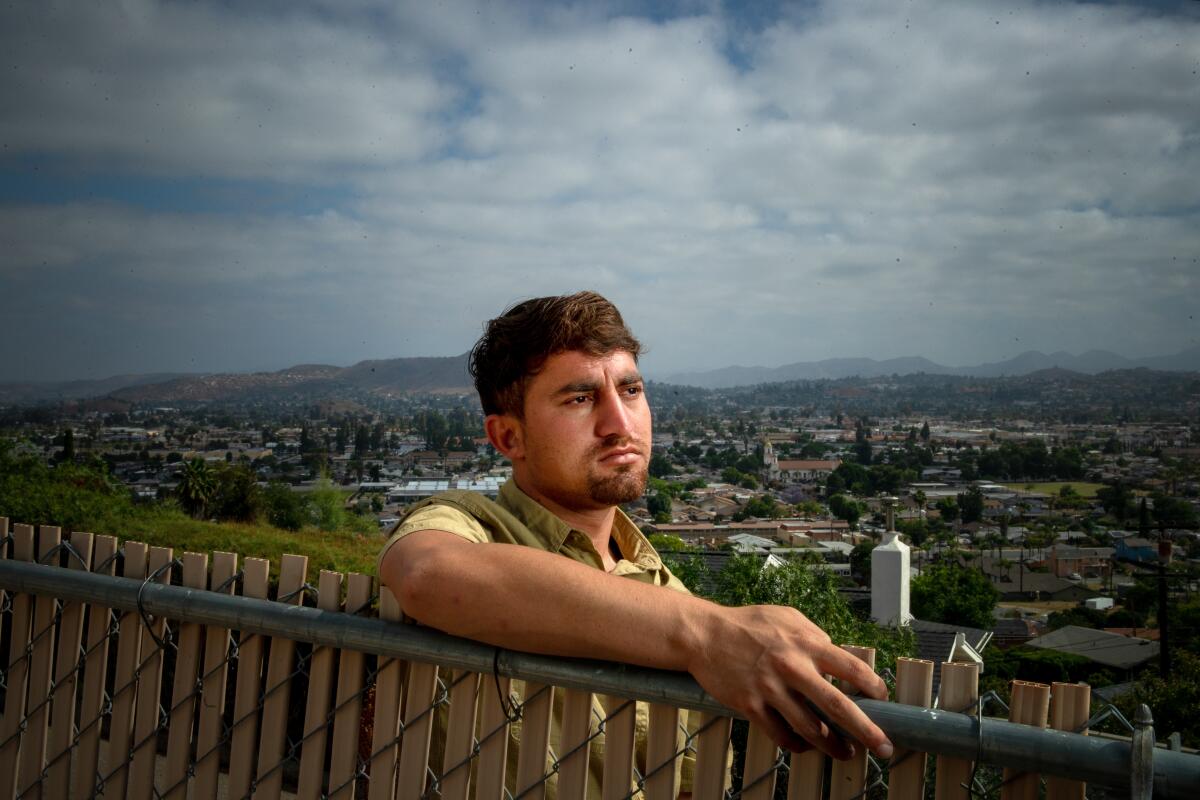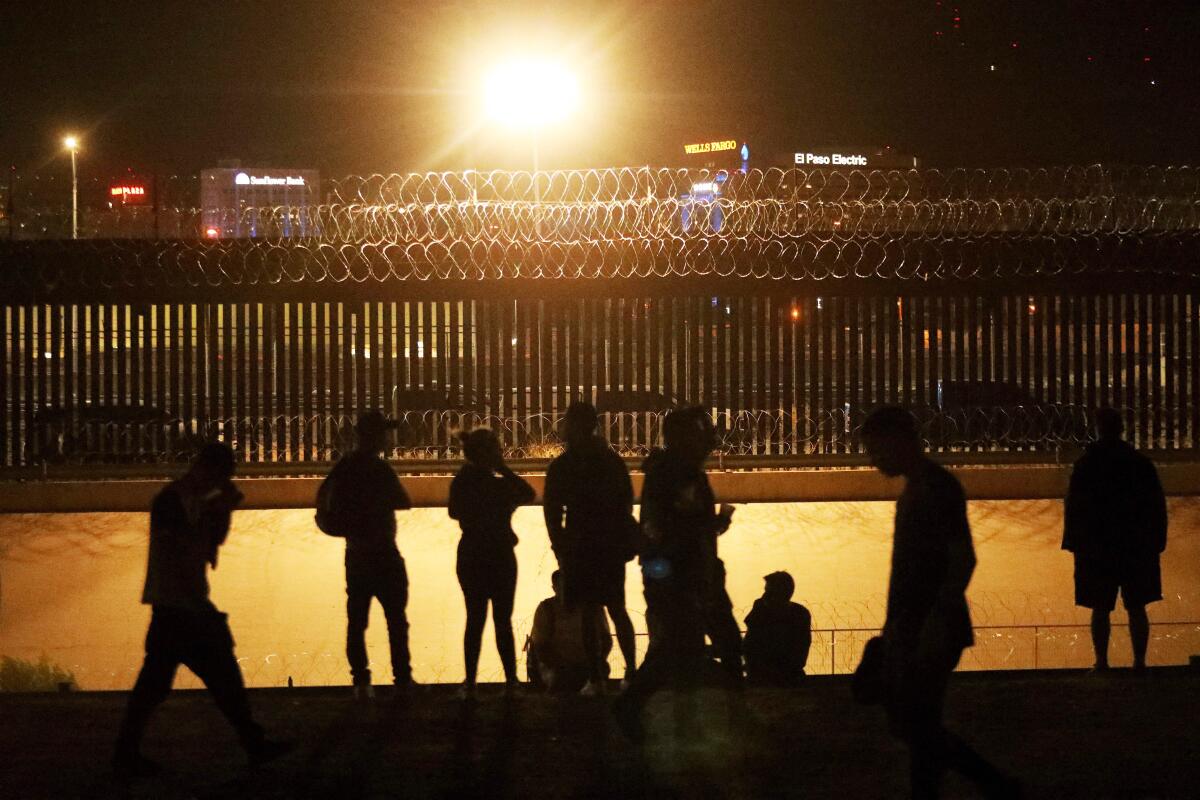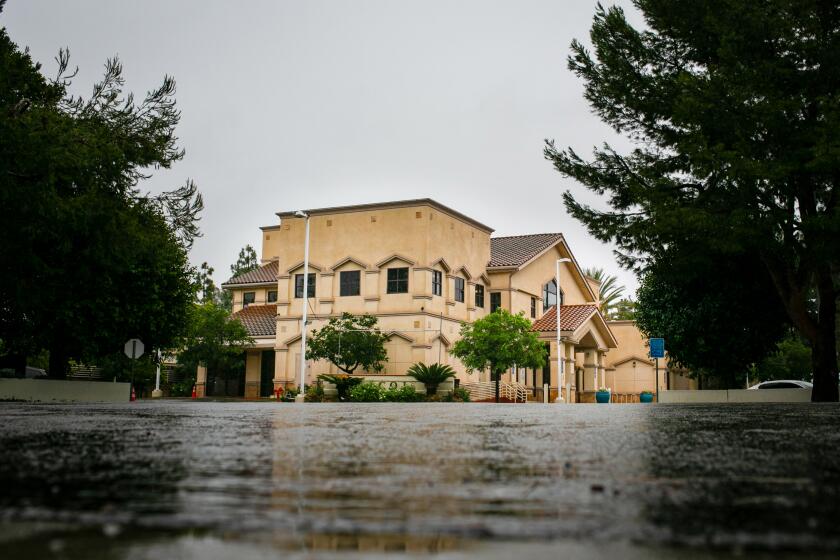Asylum seekers from Muslim-majority countries disproportionately imprisoned at Texas border

Each time he escaped danger on the journey that would eventually bring him to California, Shamsuddin Shams made sure to video-chat with his mother. She liked it that way — to not only hear his voice but see his face, even if it betrayed anguish and fear.
She saw him after he fled his native Afghanistan for good and rode into Pakistan, after he stepped past human remains while crossing the jungles of Panama, and after he escaped, in the city of Tapachula at the southern tip of Mexico, from gunmen who demanded he give up everything he had not already lost.
But when Shams, who is 25, found himself in a Texas detention facility, facing prison time for an obscure federal crime, he made a phone call instead.
“Why can’t I see your face?” his mother asked.
“I’m in a camp. I’m safe,” he lied. “The internet where I am is not working.”
“You always used to talk to me on video,” she replied.
She was incredulous, but Shams found he could keep up the charade. And so he did, for eight months, figuring a son’s deceit was more palatable than a mother’s worry.

Subscribers get exclusive access to this story
We’re offering L.A. Times subscribers special access to our best journalism. Thank you for your support.
Explore more Subscriber Exclusive content.
Shams had been snared by a previously unreported federal effort that disproportionately locked up migrants from Muslim-majority countries for the obscure crime of failing to cross the border at a formal checkpoint and report to a customs office.
The charge, conceived decades ago to fight drug trafficking, carries a maximum sentence of one year, double the length of the more well-known charge of illegal entry, which carries a top-end sentence of six months.

Only a fraction of the hundreds of thousands of people who cross the southern border each year are prosecuted for any crime at all. Most are turned back to Mexico or their home countries or released into the U.S. after claiming asylum. Although the U.S. prosecutes thousands of migrants annually for reentering the U.S. after being deported, prosecutions of first-time border crossers are less common.
For an 18-month period beginning in October 2021, however, the U.S. attorney’s office in Del Rio, Texas, charged more than 200 migrants with violating a rarely used and all but forgotten law — U.S. 19 1459, which states that anyone crossing into the United States must cross at a checkpoint and report to a customs office.
More than 60% of those charged under the failure to report law were from Muslim-majority countries, including Afghanistan, Syria, Iran and Mali, according to a Times analysis of hundreds of federal court records. Citizens of Muslim-majority countries make up a tiny portion — much less than 5% — of the people who cross the southern border, according to government data.
“If the law is being used to target people based on their religion or nationality, it raises very serious legal issues,” said Lee Gelernt, a lawyer at the American Civil Liberties Union. The Department of Justice’s manual for U.S. attorneys says that a “person’s race, religion, sex, national origin or political association, activities or beliefs” should not affect a prosecutor’s decision “to commence or recommend prosecution or take other action against a person.”
Migrants in most of the cases pleaded guilty, and many who were sentenced spent more than seven months in federal criminal custody, the records showed. Defense attorneys who sought bail for their clients were typically denied.
The Department of Justice and Department of Homeland Security would not explain what caused the surge in prosecutions.
“On a case-by-case basis, CBP refers cases for prosecution in accordance with our policies and the policies of the Department of Justice,” a CBP spokesperson said in an emailed statement. A spokesperson for the U.S. attorney for the Western District of Texas wrote in an email that “every referral to our office is evaluated on its specific set of facts in accordance with the rules of federal prosecution.”

Government officials’ refusal to answer specific questions makes it impossible to know whether the prosecutions were motivated by legitimate national security concerns, intelligence gathering, bias or something else entirely. The fact that the unusual prosecutions that disproportionately swept up migrants from Muslim-majority countries were confined to a single office of the Western District of Texas suggests that they are not part of a government-wide effort. But U.S. intelligence officials have long worried that terrorists might try to enter the country via the southern border. And the FBI, which has a history of recruiting informants in Muslim communities, has immense leverage over people in federal custody.
The court’s determination that the government may invoke the ‘state secrets’ privilege is a setback for three O.C. Muslims suing the FBI for spying.
Maureen Franco, the federal defender for the Western District of Texas, said she assumed that the migrants were held to ensure they weren’t felons or on a terrorist watch-list. But Franco also said that most of the cases her office defended involved migrants who were first-time crossers and asylum seekers. The Times found four cases in which prosecutors alleged a migrant posed a national security threat and five in which prosecutors mentioned “derogatory information,” a broad term that encompasses not only information from national security agencies but also criminal history or even past immigration violations. Another handful of migrants were wanted on criminal charges in their home countries.
Border agents, Franco noted, had been overwhelmed with the numbers of crossings in Texas, especially in the Del Rio area.
“These prosecutions also picked up after the war in Ukraine started so perhaps holding people that the U.S. government had no record of might have been justified,” she said in an email. “When I looked at the list, however, it concerned me that so many individuals were from Middle Eastern countries.”
Prosecutors in Del Rio appeared to stop bringing charges under the failure to report statute at the beginning of April, not long after The Times presented the Department of Justice and Department of Homeland Security with its preliminary findings.
Since then, federal prosecutors in Del Rio have instead prosecuted more than 50 people for the more commonly charged crime of illegal entry. The demographics of the migrants charged in federal court in Del Rio remain similar: around half are from Muslim-majority countries. Those who have been sentenced have often received the maximum sentence of six months.
“There are serious questions to be answered about the disproportionate trends in these prosecutions,” said Kennji Kizuka, director of asylum policy at the International Rescue Committee. “U.S. and international refugee law apply to all people regardless of race, nationality or religion. People seeking refuge should be received in dignity and in accordance with law, not thrown in jail.”
Court records examined by The Times indicate that two of the migrants charged with failure to report were held longer than the statutory maximum of one year after their initial arrest date and more than a dozen others have sentencing dates scheduled that would keep them in custody over the maximum.
They gathered in a snowy forest dressed in their menacing best: combat fatigues and military-style boots, their faces obscured by ski masks.
Many of the charged migrants were transferred into Immigration and Customs Enforcement custody after serving their sentences, their attorneys said.
Shams was one of those migrants.
His arduous journey led him to the United States in June 2022. In the early morning hours of June 21, he crossed the Rio Grande and reached American soil. Shams surrendered to border patrol rather than attempt to evade capture, he said.
“Now, I am going to have a better life,” he recalled thinking. “But, unfortunately it was not.”
In Afghanistan, Shams had worked as a journalist and as a campaigner for Afghan President Ashraf Ghani. He’d visited small towns and spoken with community leaders about women‘s rights.
“Ever since I was a child,” he said later, “I wanted to be a journalist.”
But in August 2021, Shams received a letter from the Taliban, who threatened to kill him, he said. He left his home in January 2022. In an interview, he recounted how his friends had not been so lucky: one was captured by the Taliban and another, a former colleague, was injured in an ISIS attack.
Shams was confused when he was told he would be put in prison for the act of seeking asylum.
“It is hard to express what I felt being told that I committed a crime,” he said through an interpreter, explaining how he was never in trouble with the law in Afghanistan. “Can you imagine how hard that was for me?” he said of the moment authorities cuffed him. “For seeking protection, for coming here to be safe and then I was told I committed a crime, I am being charged. It is hard to explain — it is like a movie, it is worse than what I saw in a movie.”
He tried to tell people he met in custody that he had not committed a crime, and that he simply wanted protection.
In the end, like most of those facing the federal charges, he pleaded guilty in October.
After he was sentenced, Shams avoided crowds and tried to stay in his cell as much as possible. He was worried he would witness something he should not. Instead, he spent most of his time studying and taking online courses offered at the facility.
During his time in custody, he finished more than 70 courses, he said. He received 32 certificates for the courses, including career skills and media training.
“I was thinking to myself: Am I that bad? Am I a bad person? Things like that were coming to my mind,” he said of being labeled a criminal.

Shams’ story lined up with those of other migrants The Times interviewed, including one Afghan man who requested to be identified by his father’s surname to shield his family from retaliation.
The man, Sulimakhil, crossed the border in April 2022 after fleeing his home country. The 28-year-old was a social activist in Afghanistan who supported the former government and collected donations for family members of Afghan soldiers who were wounded or killed in battle.
Like Shams, he was charged with failure to report.
“I tell them why I did what I did,” he said of his conversations with government officials while he was in custody. “I come for asylum. I need sympathy — I lost my dream, I lost everything, I cried — what did I do?”
He said he often asked officials he came across why he, out of the hundreds of thousands who crossed the border, was selected for prosecution. At one point, he recalled being in a cell with others charged under the same statute. He said the group included asylum seekers from Afghanistan, Syria, Egypt, Yemen and Iran.
“We were thinking that a lot of people crossed this river — why is it just us in detention?” he said.
He pleaded guilty in July 2022 and was sentenced to nine months in jail. He struggled in jail, he said, as he was surrounded by fighting in the facility.
Sometimes Sulimakhil, who now lives in California, wondered how the U.S. was paying for people like him to spend time in prison.
“What is the reason?” he said.
Mohammad, an Afghan man in his 30s who pleaded guilty under the same charge and spent seven months in criminal custody, said he crossed with people from several other, non-Muslim majority countries. He said that only he and two other Afghans he crossed with were charged with the crime.
“Why are they treating me like this?” he thought at the time.
He was a teacher in his home country and fled Afghanistan after facing threats from the Taliban.
He is ethnically Hazara, a minority that has historically faced deadly attacks from the Taliban. He was transferred to ICE after completing his criminal sentence and remains in custody today.
He faces deportation, a consequence that he says could lead to torture and death.
“I want to be clear. If my conditions in Afghanistan were OK — if I were safe there like the way it was before [the Taliban took over] — I would have never tried to immigrate here,” he said from ICE custody through an interpreter. “I was coming out of need as an asylum seeker, to flee for my life.”
The prosecutions were not limited to Afghans. Migrants from Iran, Yemen, Syria, Egypt and other Muslim-majority countries were charged, in addition to those from Colombia and other nations, such as China.
Michael Neal, an attorney with the International Rescue Committee, ended up helping a handful of Afghans who were charged.
He described them as journalists, human rights activists, women’s rights activists and those involved in education.
“All of them were here to claim asylum,” he said.
Neal said the Afghans he helped couldn’t believe they were charged with crimes for seeking asylum after the U.S. withdrew from their country.
“They still don’t understand,” he said.
One of Neal’s clients suffered from post-traumatic stress disorder following his stint in federal custody, he said.
The man had worked at a nongovernmental agency in Afghanistan and promoted women’s rights in the country. He left Afghanistan fearful for his life and expected to be in a United Nations-style refugee camp, Neal said. Instead, he was prosecuted under the failure to report law and sentenced to eight months in criminal custody. Inside detention, he struggled, especially after being strip-searched, Neal said.
“I recall hearing how broken he sounded when I spoke to him over the phone after these events,” Neal said. The man was transferred to ICE custody following his criminal sentence and Neal was able to win his release.
But the man has struggled significantly with mental health issues.
“This prosecution and imprisonment has had terrible consequences on the life of this kind and conscientious gentleman. He is one of several mostly Muslim and Middle Eastern individuals prosecuted in Del Rio. In seeking asylum in the U.S., my client experienced a different brand of persecution — selective prosecution by the U.S. government,” Neal said in an email.
Neal never saw failure to report charges during more than three years working as a federal defender in Texas before joining IRC, he said. He was taken aback at the demographics of those charged, including the fact that many were migrants from Muslim-majority countries.
“I was actually surprised by how obvious it is,” he said.
Historically, prosecutions under the failure to report statute have been rare, and not reserved for migrants. The amendment that made failing to report a crime was passed as part of a congressional anti-drug effort in the late 1980s.
“By imposing a new criminal penalty on those who failed to report immediately to agents after crossing the border, the provision was geared to allow agents to focus its enforcement efforts on those most likely to be drug smugglers, since those who were not smugglers would comply with the new law,” said Yael Schacher, director for the Americas and Europe at Refugees International and a historian of U.S. immigration. “The penalty was thus designed to be imposed on drug smugglers.”
One failure to report prosecution became a national news story. The plight of Abdul Wasi Safi, a former Afghan special forces soldier who helped the U.S. military and was prosecuted after he sought asylum in the U.S., attracted bipartisan concern, legal resources and public outcry.
Rep. Dan Crenshaw, a Texas Republican, backed Safi and said that the Biden administration needed to “remedy” his situation.
After national attention, the Department of Justice dropped the charges against Safi in January and he was released.
In El Cajon, Shamsudin Shams is video-calling his mother again.
He has an active asylum case with the U.S. government and is waiting for a work permit.
He’s living with his brother in a small apartment and taking English courses. Shams is still under a yearlong court-mandated supervision period, and he has to check in with a probation officer and submit to drug tests.
“I don’t do drugs — I have never been involved in this. I can give them a drug test every day, every week,” he said.
He’s happier, finally. He believes he will have an opportunity to pursue his dreams in relative safety.
He still plans to seek work as a journalist.
More to Read
Sign up for This Evening's Big Stories
Catch up on the day with the 7 biggest L.A. Times stories in your inbox every weekday evening.
You may occasionally receive promotional content from the Los Angeles Times.












